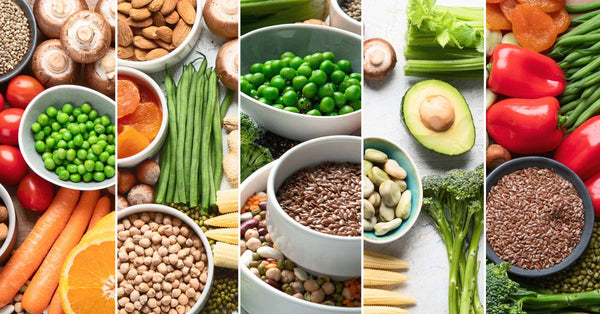No Products in the Cart

Plant based protein powders have suddenly seen a surge in popularity, especially in the face of pandemic.
People are moving to a more vegan lifestyle following a shift towards plant sources of protein even for supplements.
Despite the fame that plant proteins have long received, there is still a lot of confusion around it due to the pool of myths surrounding it.
We don’t know who needs to know this, but plant based protein supplements are reliable sources for your workout performance, progress and recovery. Hence, let nobody tell you otherwise.
Time to kick some ugly myths out with facts and “facts” only!

“We suggest, not judging a book by its cover but please always judge a product by its label”
Why?
Because, if the label says it has a full ‘essential amino acids’ profile then it is a complete protein without a question.
This myth is purely based on people considering plants as an inferior source of protein lacking amino acids when compared to animal protein sources like meat and eggs.
However, there are many plant based foods that are complete proteins like, quinoa, pea, chia seeds, soy, etc.
In addition, protein powders with pea and brown rice in particular break right through this myth with a PDCAAS (Protein Digestibility Corrected Amino Acid Score) of 1.0, highest score putting it as an equal to animal sourced protein.
Quick Fact: bGREEN created pea protein with brown rice protein to balance the lysine, and cysteine + methionine profile, which comes from pea and brown rice respectively. We don’t want to brag, but a protein profile this fine has to be considered among the best plant based proteins.

A myth that has been slammed by many scientific research and studies time and again for all the right reasons.
Sadly, people see plant sources of protein and plant based protein supplements to be not as effective as animals or any other protein in the market.
There are simply two supporting reasons to clear out this myth.
First, you try the green plant protein yourself and decide and second, don’t believe us but believe science!
Many scientific studies including one that was conducted on athletes consuming pea protein vs those on animal protein showed the exact effects on muscle growth.
So, if anyone tries to bluff you with this myth, you better give them a glimpse of your vegan muscle with plant based protein consumption.

Being an extension of the myth that considers ‘plant based protein as incomplete’, this one takes it to another level. People feel consuming more than recommended will help them with a complete protein profile and add a greater value to their workout.
This however, is absolutely ridiculous as nothing in excess is ever good.
Let’s look at how much protein our body ideally requires?
We can soak up to 20g of protein and 25g is considered optimal for those practicing an active lifestyle with routine workout and physical activities. Overdosing yourself with 30g or 50g won’t do you any good.
Recommended intake per serving?
25g protein per serving is more than enough for a fit muscular and toned body.

Okay! So those who have tried plant based protein would relate to what we say. But, before that, let’s try to understand what has paved the way for this myth to exist in the first place.
Generally, animal protein powders like whey protein in the market have long been a reliant source but are infamous for their issues with the gut. One common reason being the presence of milk in whey that is difficult to digest for many especially those who are lactose intolerant.
Thereby, the misconception about plant protein has been picked from there and everyone feels they too take forever to absorb and digest. But fortunately, that is not the case!
In fact, pea plant protein powders are light on the stomach and cause no gut issues like bloating, gas, diarrhea and so forth. Reason, simply being the fact that it is made from animal free-sources. To elaborate, it has no milk component which contains lactose, the main carb in whey protein. Many people don’t have lactase to digest this carb and the absence of this in plant based protein is what makes it easier for anyone to digest it.
Plus they are hypoallergenic, that means they tend to cause no allergies when touched, eaten or used, making them 100% safe for consumption.

Says who? Only those who do not actually read the nutrients profile of products in general.
Considering all plant based protein supplements low on nutrients profile is not fair. Though this could differ brand to brand and in case of animal and whey protein as well.
Actually, vegan protein powders are generally designed to add a good nutrient value to your diet for better performance.
Let’s have a quick face off between animal and plant protein.
bGREEN pea and brown rice plant protein comes with:
Making it a complete source with the benefits of green tea extracts. Moreover, it happens to be a 100% vegan protein powder that is also lactose, gluten and soy free.
Surprisingly, plant based proteins provide more nutrients than just protein, with good fiber and vitamins like b12 unlike animal sources which are high on sodium, fats and carbohydrates, lacking antioxidants, big time!
Hope our efforts have gotten you the awakening much needed and for those who already believed in the goodness of plant protein powders, this has been nothing but a reassurance. You can definitely rely on them. Start today, give pea plant based protein a shot for performance excellence with the cleanest VEGAN conscience.